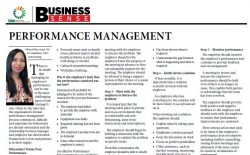Nikita Pillay - Performance Management2020-07-01 There is no doubt that managing an employee's performance can be one of the most challenging parts of any manager's role. Often by the time that the organisation's formal performance management process commences, difficult and unproductive behaviours are already entrenched and the relationship between manager and employee has deteriorated. Productivity is low and patience is in short supply.
Misconduct Versus Poor Performance It is important to know the difference between misconduct and poor performance. Confusing the two could mean your approach is completely wrong. The main difference is in the level of control. Poor performance is when an employee tries as hard as possible but keeps falling short because they lack skill, ability or training for example. In cases of misconduct, the employee could perform better but for whatever reason chooses not to. What are the reasons for poor performance? There are many reasons why an employee may perform poorly. Some of the common reasons include:
Dismissal will probably be adjudged to be unfair if the reason for the poor performance was that:
Step 1 - Identify the problem It is important to understand the key drivers of performance or poor performance within the workforce. It is also important to identify the problem specifically. Step 2 - Assess and analyse the problem The employer should determine:
Step 3 - Meet with the employee to discuss the problem It is important that the meeting takes place in private and in an environment that is comfortable and nonthreatening, away from distractions and interruptions. The employer should begin by holding a discussion with the employee to explain the problem in specific terms. From this conversation, the employee should be able to clearly understand:
When having this type of meeting, it may be useful in facilitating discussion to refer to recent positive things that the employee has done to show them that you also recognise and appreciate their strengths. Key points for employers to remember when holding the meeting are to:
Where possible, it is important that a solution is jointly devised with the employee. An employee who has contributed to the solution will be more likely to accept and act on it. When working out a solution, the employer should:
The employer should keep a written record of all discussions relating to poor performance in case further action is required. Generally, it may also be used as evidence if legal action is taken about the matter. Step 5 - Monitor performance The employer should monitor the employee's performance and continue to provide feedback and encouragement. A meeting to review and discuss the employee's performance should be held even if there is no longer an issue. This enables both parties to acknowledge that the issue has been resolved. The employer should provide both positive and negative feedback to the employee and should work with the employee to ensure that performance improvements are sustained. More serious action may need to be taken if the employee's performance does not improve including further counselling, issuing formal warnings and ultimately if the issue cannot be resolved, termination of employment. Termination of employment If an employee's performance does not improve to an acceptable standard, termination of their employment may be an option. Employers cannot dismiss their employees in circumstances that are "harsh, unjust or unreasonable". What is harsh, unjust or unreasonable will depend on the circumstances of each case. However, it is important to be fair to employees particularly when it comes to termination of employment. They should be given reasons for dismissal and an opportunity to respond to those reasons. Employers should not dismiss poor-performers without having attended to the above requirements and without having followed proper procedure. Where the employer is at all unsure as to whether it is within its rights to dismiss a poor performer, it should first get advice from a reputable labour law expert. Nikita Pillay Nikita@drg.co.za T: +27 (0)31 767 0625 W: www.drg.co.za |
Nikita Pillay - Performance Management
Copyright © 2026 KwaZulu-Natal Top Business
